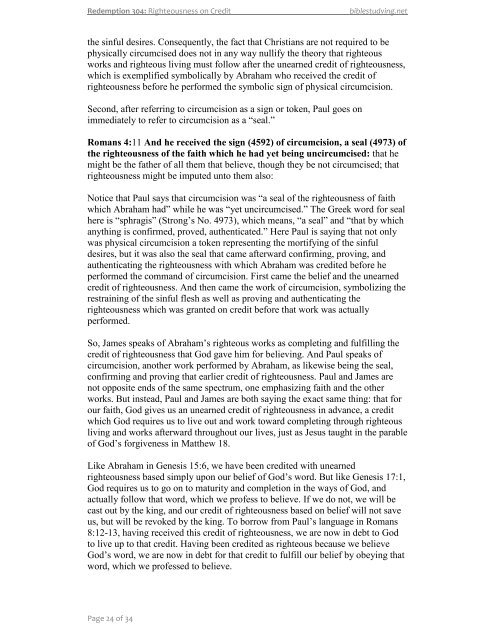righteousness-credit
righteousness-credit
righteousness-credit
Create successful ePaper yourself
Turn your PDF publications into a flip-book with our unique Google optimized e-Paper software.
Redemption 304: Righteousness on Credit<br />
biblestudying.net<br />
the sinful desires. Consequently, the fact that Christians are not required to be<br />
physically circumcised does not in any way nullify the theory that righteous<br />
works and righteous living must follow after the unearned <strong>credit</strong> of <strong>righteousness</strong>,<br />
which is exemplified symbolically by Abraham who received the <strong>credit</strong> of<br />
<strong>righteousness</strong> before he performed the symbolic sign of physical circumcision.<br />
Second, after referring to circumcision as a sign or token, Paul goes on<br />
immediately to refer to circumcision as a “seal.”<br />
Romans 4:11 And he received the sign (4592) of circumcision, a seal (4973) of<br />
the <strong>righteousness</strong> of the faith which he had yet being uncircumcised: that he<br />
might be the father of all them that believe, though they be not circumcised; that<br />
<strong>righteousness</strong> might be imputed unto them also:<br />
Notice that Paul says that circumcision was “a seal of the <strong>righteousness</strong> of faith<br />
which Abraham had” while he was “yet uncircumcised.” The Greek word for seal<br />
here is “sphragis” (Strong’s No. 4973), which means, “a seal” and “that by which<br />
anything is confirmed, proved, authenticated.” Here Paul is saying that not only<br />
was physical circumcision a token representing the mortifying of the sinful<br />
desires, but it was also the seal that came afterward confirming, proving, and<br />
authenticating the <strong>righteousness</strong> with which Abraham was <strong>credit</strong>ed before he<br />
performed the command of circumcision. First came the belief and the unearned<br />
<strong>credit</strong> of <strong>righteousness</strong>. And then came the work of circumcision, symbolizing the<br />
restraining of the sinful flesh as well as proving and authenticating the<br />
<strong>righteousness</strong> which was granted on <strong>credit</strong> before that work was actually<br />
performed.<br />
So, James speaks of Abraham’s righteous works as completing and fulfilling the<br />
<strong>credit</strong> of <strong>righteousness</strong> that God gave him for believing. And Paul speaks of<br />
circumcision, another work performed by Abraham, as likewise being the seal,<br />
confirming and proving that earlier <strong>credit</strong> of <strong>righteousness</strong>. Paul and James are<br />
not opposite ends of the same spectrum, one emphasizing faith and the other<br />
works. But instead, Paul and James are both saying the exact same thing: that for<br />
our faith, God gives us an unearned <strong>credit</strong> of <strong>righteousness</strong> in advance, a <strong>credit</strong><br />
which God requires us to live out and work toward completing through righteous<br />
living and works afterward throughout our lives, just as Jesus taught in the parable<br />
of God’s forgiveness in Matthew 18.<br />
Like Abraham in Genesis 15:6, we have been <strong>credit</strong>ed with unearned<br />
<strong>righteousness</strong> based simply upon our belief of God’s word. But like Genesis 17:1,<br />
God requires us to go on to maturity and completion in the ways of God, and<br />
actually follow that word, which we profess to believe. If we do not, we will be<br />
cast out by the king, and our <strong>credit</strong> of <strong>righteousness</strong> based on belief will not save<br />
us, but will be revoked by the king. To borrow from Paul’s language in Romans<br />
8:12-13, having received this <strong>credit</strong> of <strong>righteousness</strong>, we are now in debt to God<br />
to live up to that <strong>credit</strong>. Having been <strong>credit</strong>ed as righteous because we believe<br />
God’s word, we are now in debt for that <strong>credit</strong> to fulfill our belief by obeying that<br />
word, which we professed to believe.<br />
Page 24 of 34


